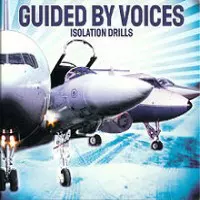Imagine that one of the greatest songwriters in the world came up to you and said, "Hey, I got together with my friends last weekend and recorded some new tunes in my basement. Want the tape?" What would you say? "Wow! I can't wait to hear what you've been up to!" Or perhaps, "There's no way I'm wasting time on hissy recordings, no matter how good your material is." Unfortunately for Robert Pollard, frontman of Guided By Voices, too many music fans gave the second reply in the '90s, leaving such lo-fi masterpieces as Propeller, Bee Thousand and Alien Lanes largely unheard, except by critics and indie rock cultists. The average listener just couldn't fathom that a track with an odd title like "Tractor Rape Chain," modestly recorded at someone's house, could be the equal to a pop masterpiece like the Beatles' "I've Just Seen a Face." Yet it is.
Isolation Drills was the culmination of the band's decision, in the late '90s, to gradually enhance the recording quality and accessibility of their music while trying to preserve its intelligence and melodic richness. In hopes of attracting a bigger audience, the band adopted a rich, clean sound, and employed it to craft songs chock-full of memorable vocal harmonies and full guitars. More than any other Guided by Voices album, this one had a distinctly rhythmic footprint. This was due to the exacting guitar work of the virtuosic Doug Gillard, whose presence was at least partly responsible for the slicker and more elaborate riffage.
Opener "Fair Touching" charges ahead with Pollard's brand of hooky rock that was previously muffled by shoddy recording quality. It makes perfect use of an attention-grabbing riff, which wanders off into verse-and-chorus terrain before returning to triumphantly close out the song. "Chasing Heather Crazy" shows off the band's mastery of Cheap Trick-worthy pop songcraft. And there are many more gems here, like "Run Wild," "Twilight Campfighter" and "Unspirited," whose choruses all soar like the jets on the album cover. But the album's unquestionable highlight (and one of the band's career highlights) is "Glad Girls." It's unpretentious, ridiculously catchy and easy to sing along to, and represents the album's energetic peak.
Veteran fans will likely note that, in comparison to the band's lo-fi classics, this particular batch of songs blends together in a much more homogenous manner, which proves to be a mixed blessing. Most rock bands function exactly like this, treating uniformity as a quality rather than a hindrance, but Guided by Voices is a different animal. On the one hand, the clean studio production does rob Isolation Drills of the timeless and unique ambience of an album like Bee Thousand, making it easier for indie purists to discredit the album as a disingenuous cash-grab, but on the other hand, you're never left to imagine what a song could have been like if Pollard had spent more time tidying things up (as is the case with a classic like "Wished I Was a Giant," which is beautiful while being impossible to sing along to because Pollard's voice is drowned out by the music). And as is the case with almost all of their recordings, the album runs into a few bad ideas, with the formless "Frostman" doing nothing to justify its brief 56 seconds, and "Want One?" being somewhat annoying in its grungy intonations. But these are a just few stumbles in a nearly-flawless run.
With this album, I believe that Robert Pollard consciously set out to make one of the biggest, greatest and most anthemic albums of his career, and he absolutely succeeded. Isolation Drills was as fine a batch of songs as he has ever written, and it's been buffed to a muscular sheen, sounding ready for arenas as much as bars. Certain fans of the band might miss the tape hiss, but with songs as good as these ones, that hardly matters. And for those who are nervous about trying out a band whose best songs tend to sound not unlike demos, this is an ideal starting point.
